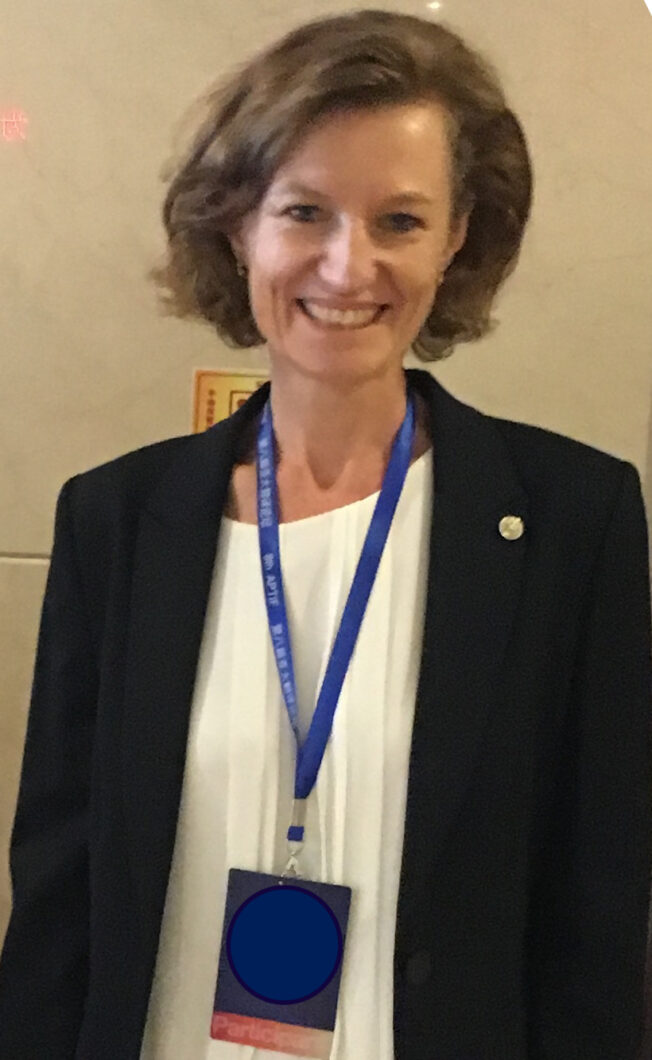interviewed by In Touch’s Editorial Committee
In September 2022, Brisbane-based translation practitioner Alison Rodriguez was elected to the presidency of FIT, the ‘voice of associations of translators, interpreters and terminologists around the world’. Along with NAATI, AUSIT is one of 138 organisations across 56 countries that are members of FIT (and NAATI is an associate member). In Touch’s Editorial Committee recently interviewed Alison about T&I, the aims of FIT and the benefits of membership.

‘If there is an extensive, universal,
permanent profession, it is ours.’
What led you into the translation profession?
It may not have been the most straightforward path, but I think if you’re a language person, and I am, you sense it from a very young age. You find yourself making connections, playing with words and meanings, having fun with language – and I guess an interest in other languages just stems from there.
I would say the interest in translation, for me, came from home. While we lived in a monolingual, fairly monocultural world, I heard different languages from extended family, and my father often used Māori (te reo) words. In this way I learned very early on that the word is not the object, that there are many words for any one object. So, I guess it was no surprise that I went on to study linguistics, art and cultural studies, along with translation.
One of my professors said ‘Oh, you’re actually quite good at this’, and I took that as a sign. It’s something I often say to younger people, because they’re told ‘Do what you love’. I would say okay, but consider doing something you’re also good at; joy will come with mastery.
We ask because we wonder if we’re going to run out of future T&I professionals …
I hope not. FIT encourages professionals to talk to graduating students, to show them that there’s a career path into T&I. In 2015, I sat in on a presentation by LSPs (language service providers) who were lamenting the loss of graduates to other job streams, because they just couldn’t see that path. So, it’s important to encourage secondary students to study languages, and for graduates to see that there are still rewarding and worthwhile careers in T&I. Professional associations play an important role in offering support to new T/Is, helping them visualise that path through mentoring and CPD (continuing professional development).
There’s also the impact of translation technologies on the profession …
Yes! Translators and interpreters have been asking themselves how technology will change their work for two decades, so we have a better grasp of the reality than many other professions. Our experience should be encouraging to those in related fields, as technology hasn’t taken over our jobs, although it has changed them.
The advent of neural machine translation (NMT) has streamlined our work; however, it’s a useful tool, not a solution for every situation. In time, people will realise that while it might work for Whatsapp messages and social media posts with a tolerable level of error, they probably can’t use it to translate their business contracts, novels or affidavits … and if they do, they’ll only try it once before realising they need a professional. Fortunately, translators’ skills in the humanities, along with our general cultural and deep subject knowledge, allow us to mitigate risk and potential damage.
What is FIT’s main role?
As an international federation, FIT represents associations of translators, interpreters and terminologists on the international stage. We have consultative status with the UN, and work with international partners to increase visibility and amplify the voice of our members. There are many moving parts to FIT, with committees working on audiovisual translation, translation in crisis settings, Indigenous languages, standards, literary translation and copyright, just to name a few.
FIT also connects member associations to one another and acts to build cooperation and understanding between its members. Our main strategic priorities are community, visibility and a sustainable future for the profession, and this involves supporting our various national associations.
We also hold events – our Legal Translation Forum will be held in Spiez, Switzerland in July this year. We’re hoping to hold our Presidents’ Forum again in 2023, so the heads of our member associations can meet and share experiences, challenges and best practice. The XXIII FIT World Congress will be in Costa Rica, in 2025. Our highest-profile event is International Translation Day each 30 September. We’ve been celebrating ITD since 1991, and each year Council chooses a theme and invites everyone to celebrate the day around it.
What is FIT’s main role?
As an international federation, FIT represents associations of translators, interpreters and terminologists on the international stage. We have consultative status with the UN, and work with international partners to increase visibility and amplify the voice of our members. There are many moving parts to FIT, with committees working on audiovisual translation, translation in crisis settings, Indigenous languages, standards, literary translation and copyright, just to name a few.
FIT also connects member associations to one another and acts to build cooperation and understanding between its members. Our main strategic priorities are community, visibility and a sustainable future for the profession, and this involves supporting our various national associations.
We also hold events – our Legal Translation Forum will be held in Spiez, Switzerland in July this year. We’re hoping to hold our Presidents’ Forum again in 2023, so the heads of our member associations can meet and share experiences, challenges and best practice. The XXIII FIT World Congress will be in Costa Rica, in 2025. Our highest-profile event is International Translation Day each 30 September. We’ve been celebrating ITD since 1991, and each year Council chooses a theme and invites everyone to celebrate the day around it.
Have you chosen a theme for this year?
This year’s theme – ‘Translation unveils the many faces of humanity’ – highlights the many ways that translation unveils a world of human experience, allowing us a peek into cultures other than those we know and underlining our shared humanity.
As climate and geopolitical shocks resonate across the globe, we play a pivotal role in addressing threats to peace and security of people and the planet, and in diplomacy and multilateralism, sustainable development and humanitarian aid, human dignity and human rights.
In May 2017, Resolution A/RES/71/288 of the 71st Session of the United Nations General Assembly unanimously declared 30 September as an international day, to honour the contribution of professional translators, interpreters and terminologists in connecting nations, and fostering peace and global development. This year we join to celebrate the many human faces that become visible through translation.
As this is the 70th anniversary year of the founding of FIT by Pierre-François Caillé, we’re also taking the opportunity to celebrate the many faces that make up the history of our federation, including AUSIT’s own past president of FIT, Adolfo Gentile, who is now a FIT Honorary Advisor.
T/Is are rightly proud of our profession’s heritage. We’ve served throughout history to help people communicate across cultural barriers, and as a profession we look forward to continuing to play a crucial role in helping humanity meet challenges in all the ways that technology alone cannot. To quote Pierre-François Caillé, ‘If there is an extensive, universal, permanent profession, it is ours.’
Thank you for your time today, Alison, and good luck in the rest of your presidency.



